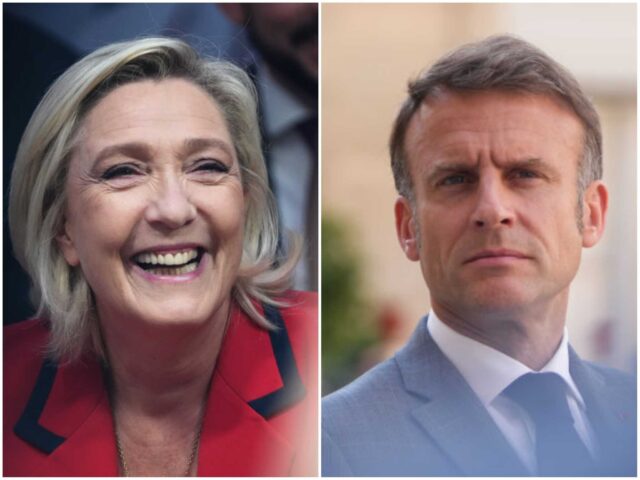Populist right leader Marine Le Pen says her party would use the commanding position it is predicted to soon enjoy in the French Parliament to block President Macron from deploying soldiers to the Ukraine War.
French President Emmanuel Macron has spoken openly and repeatedly about his interest in getting directly involved in the Ukraine War, by committing his own troops there. But France is two days from kicking off a week-long, two-round parliamentary election in which the anti-war populists (National Rally, RN) led by Marine Le Pen are polled to come first, and they say they wish to block any such intervention, triggering a mini-constitutional crisis.
While as President, Macron is the chief of the armed forces and has the prerogative to deploy soldiers at will, Le Pen asserts that his position confers no ability to grant funding. Looking to a post-election situation where RN dominated the French Parliament and her party colleague Jordan Bardella is French Prime Minister, Le Pen said they would seek to block deployment by withholding money.
Polling looks good for RN, with aggregate polls placing the party in the early-to-mid 30s. But France has a two-stage election system, which has punished the RN in the past, and these runoffs can be hard to predict.
Le Pen said, reports French conservative broadsheet Le Figaro: “Chief of the armed forces, for the President is an honorary title since it is the Prime Minister who holds the purse strings… Jordan [Bardella] has no intention of picking a fight with him, but he has set red lines. On Ukraine , the president will not be able to send troops… in matters of sending troops abroad, the Prime Minister has, through budgetary control, the means of opposing it.”.
Le Pen said she didn’t wish to “call into question” the competencies of the President, but allies of Macron immediately leapt into action to oppose what they said was an attack on the French constitution itself. France TV Info cited the remarks of Mayor Francois Bayrou, a prominent Macron supporter, who said Le Pen was “deeply” undermining the constitution, rebutting her suggestion the position of head of the army was merely honorary.
He countered that the President is: “…the one who appoints civil and military posts in the State, the one who chairs the Defense Councils, the one of whom the Constitution says in full ‘he is the head of the armies’.”
Meanwhile, Ukrainian President Volodymyr Zelensky has expressed his expectation that, whatever the outcome of next week’s election, the French government will still support his nation. In very clear reference to claims that Le Pen’s party has had sympathy with Vladimir Putin in the past, Zelensky said: “We believe that the French will continue to support Ukraine whatever the political situation… We are convinced that the next government will be independent of the Russian aggressor and will remain committed to European values and a strong and united Europe, the very Europe that Ukraine defends against Russian tyranny.”
Bardella, the youthful RN faction leader who looks poised to be the country’s next Prime Minister has made clear that while he is dead-set against sending French troops to Ukraine, he would support the continuation of the French commitments made so far. He had said, reports rfi: “I do not intend to call into question the commitments made by France on the international scene and harm our credibility at a time of war at Europe’s door… My red line remains long-range missiles or any military equipment that could lead to escalation, by which I mean anything that could directly hit Russian cities.”
Bardella also spoke on Russia itself, calling it a threat to Europe. He said: “I see Russia as a multi-dimensional threat both for France and Europe… I will be extremely vigilant to any attempted interference by Russia but also by any other states or powers in the world.”
As previously reported, French President Emmanuel Macron has been insistent, bordering on obsessive, on the subject of deploying NATO troops directly to Ukraine this year. This topic had been the subject of a de-facto omerta by Western leaders through the conflict so far, who were content to supply cash and equipment, but stopped short of any suggestion of actual contact with Russian troops.
Macron blew that wide open in February when he broached the subject for the first time, then continued to repeatedly bring up it, despite the obvious disquiet of other European leaders. In May, he banged that drum again, saying Europe should not rule anything out, saying he wanted to make a “strategic wake-up call for my counterparts.”
The first round of French voting to select their next parliament begins on Sunday June 30th with a knockout round. Except cases where one hopeful gets more than 50 per cent in the first round, all candidates for each constituency are removed from the ballot except the top-two scoring individuals, who then go head-to-head again the following Sunday, July 7th, to determine the winner.

COMMENTS
Please let us know if you're having issues with commenting.